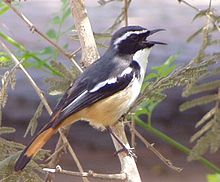Dessonornis
| Dessonornis | |
|---|---|

| |
| white-throated robin-chat (Dessonornis humeralis) | |
| Scientific classification | |
| Domain: | Eukaryota |
| Kingdom: | Animalia |
| Phylum: | Chordata |
| Class: | Aves |
| Order: | Passeriformes |
| Family: | Muscicapidae |
| Genus: | Dessonornis Smith, 1836 |
| Type species | |
| Dessonornis humeralis | |
Dessonornis is a genus of birds in the Old World flycatcher family Muscicapidae that are found in Sub-Saharan Africa.
Taxonomy
The genus Dessonornis was introduced in 1836 by British ornithologist Andrew Smith to accommodate a single species, the white-throated robin-chat, which is therefore considered as the type species.[1][2] The name Dessonornis is a misspelling, Smith corrected it to Bessonornis in 1840.[3] The name combines the Ancient Greek bēssa meaning "glen" or "wooded valley" with ornis meaning "bird".[4] The spelling correction is not recognized by International Ornithologists' Union.[5]
Species in this genus was previously placed in Cossypha, while phylogenetic studies revealed that they are more closely related to Cichladusa and Xenocopsychus.[6] In the taxonomic revision to create monophyletic groups, Dessonornis was resurrected with the following species:[5]
- White-throated robin-chat, Dessonornis humeralis
- Cape robin-chat, Dessonornis caffer
- Archer's ground robin, Dessonornis archeri
- Olive-flanked ground robin, Dessonornis anomalus
References
- ^ Smith, Andrew (1836). Report of the expedition for exploring central Africa, from the Cape of Good Hope, June 23, 1834, Under the Superintendence of Dr. A. Smith. Cape Town: Printed at the Government Gazette Office. p. 46.
- ^ Mayr, Ernst; Paynter, Raymond A. Jr, eds. (1964). Check-List of Birds of the World. Vol. 10. Cambridge, Massachusetts: Museum of Comparative Zoology. p. 50.
- ^ Smith, Andrew (1840). Illustrations of the Zoology of South Africa. Vol. 2, Aves. London: Smith, Elder. Plate 48, text. The book was published in parts. The part including Plate 48 was published in March 1840. See: Barnard, K.H. (1950). "The dates of issue of the "Illustrations of the Zoology of South Africa" and the "Marine Investigations in South Africa"". Journal of the Society for the Bibliography of Natural History. 2 (6): 187–189. doi:10.3366/jsbnh.1950.2.6.187.
- ^ Jobling, James A. (2010). The Helm Dictionary of Scientific Bird Names. London: Christopher Helm. p. 134. ISBN 978-1-4081-2501-4.
- ^ a b Gill, F; Donsker, D; Rasmussen, P, eds. (2023). IOC World Bird List (v 13.2). doi:10.14344/IOC.ML.13.2 (inactive 1 November 2024).
{{cite book}}: CS1 maint: DOI inactive as of November 2024 (link) - ^ Zhao, M.; Gordon Burleigh, J.; Olsson, U.; Alström, P.; Kimball, R.T. (2023). "A near-complete and time-calibrated phylogeny of the Old World flycatchers, robins and chats (Aves, Muscicapidae)". Molecular Phylogenetics and Evolution. 178: 107646. Bibcode:2023MolPE.17807646Z. doi:10.1016/j.ympev.2022.107646. PMID 36265831.
